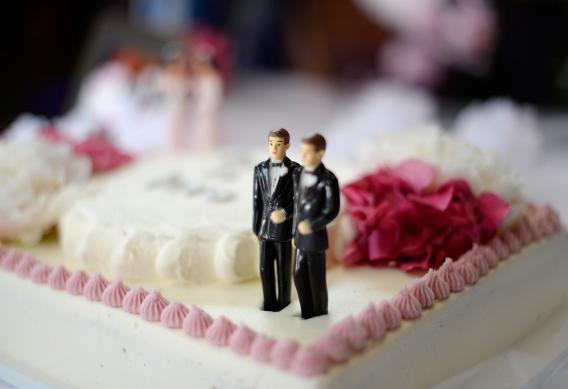Following on an initial story last week from LGBT news site Gay Star News, news outlets across the Internet reported on Friday that the editors of the Oxford English Dictionary—the publication widely recognized as the premiere authority on the English language—are considering revising the definition of marriage to include same-sex unions. The change was attributed to recent decisions in favor of marriage equality in the U.K. and elsewhere and touted as a victory for the LGBT movement.
Though such a development would not be unwelcome, we had a sneaking suspicion while sorting through the coverage that this story might be a bit overblown. Here’s the original quote, from an OED spokeswoman, that caused all the hoopla: “We continually monitor the words in our dictionaries, paying particular [attention] to those words whose usage is shifting, so yes, this will happen with marriage.” By our reading, this statement simply confirms that the OED will consider revising the definition of marriage in the same way that it does for any word whose usage is changing—not that any new definition is definitely forthcoming. And indeed, the Director of U.S. Publicity for the Oxford University Press confirmed our interpretation today in an official statement:
Many of our dictionaries including the Oxford English Dictionary, as well as oxforddictionaries.com, already include references to same sex-marriage as part of their definitions. Dictionaries reflect changes in the use of language, rather than changes in law, and we are constantly monitoring usage in this area in order to consider what revisions and updates we may need to make. The English language is always developing and, along with many other words, we will continue to monitor the way in which ‘marriage’ is used.
In other words, the definition may change in the future, when the editors feel that general usage has shifted enough to include same-sex unions (beyond the special “references”), but that day has not yet arrived. In an earlier email, the same spokesperson agreed that “the article that started the to-do was based on a misinterpretation of our standard boilerplate.”
You’ll note in the statement a distinction between the OED and oxforddictionaries.com (formally known as the Oxford Dictionaries Online), a crucial one that has been ignored in the reporting of this story. The discriminatory definition that most reporters quoted on Friday (“The formal union of a man and a woman, typically as recognized by law, by which they become husband and wife”) is not actually from the OED. Rather it is from the ODO, which acts as a quick-reference, common-usage source, in contrast to the OED’s more historical, scholarly approach. (It’s worth mentioning that the ODO does include a note indicating that same-sex marriage is a thing in “some jurisdictions.”)
As for the actual OED (subscriber only), the oldest—and, due to formatting conventions, first—definition is this: “The condition of being a husband or wife; the relation between persons married to each other; matrimony.” While this entry includes a comment similar to the one above acknowledging gay marriage, it appears redundant. Notice that when marriage is thought of as a “condition” or “relation,” as it is here, the genders of those in the pair need not be specified, nor are they in this language—depending on how narrowly you read the words husband and wife—which has been in place with only minor changes since at least 1989, according to the entry’s revision history. It could be argued that, when read closely, the more conservative OED definition includes same-sex marriage after all.
Brow Beat thanks Ben Zimmer of the Visual Thesaurus and Vocabulary.com.
